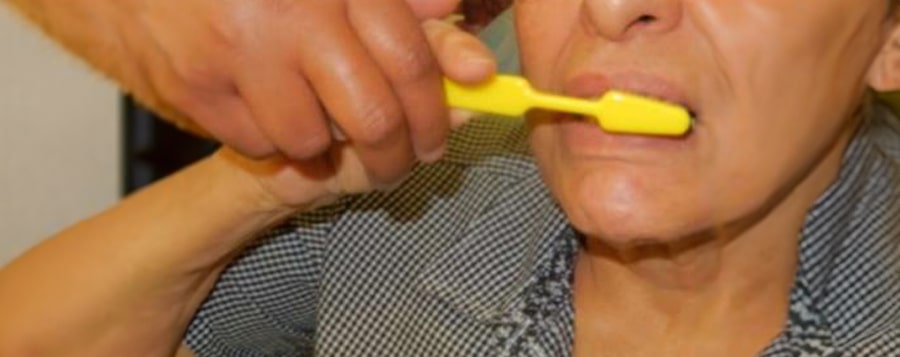Download brochure (1 MB, PDF)
Why Is Oral Health Important?
Good oral health helps us smile, chew and Problems: speak better. A healthy mouth allows us to enjoy eating without pain or infection.
Oral health is important for everyone. Even if your loved ones have few teeth remaining, or no natural teeth left, daily oral care is essential.
Problems caused by poor oral health:
- Pain and difficulty eating
- Malnutrition (Poor nutrition)
- Unstable diabetic control (difficulty in managing blood sugar level)
- Serious lung infection (especially in persons with swallowing problems)
What Are Oral Diseases?
Two very common oral diseases are:
- Gum Disease
- Tooth Decay
Both are dental infections that can cause pain and loss of teeth.
What to Look Out for?
Some signs that your loved ones may be experiencing oral problems:
- Refusing to eat
- Refusing to wear dentures
- Refusing to brush teeth
- Holding their face in response to pain
- Increased restlessness, agitation, shouting
- Disturbed sleep
Tips for Better Oral Health
-
Brush twice a day (especially at night!)
- For persons with teeth, use a fluoride containing toothpaste
- For persons with no teeth, continue brushing with a soft toothbrush to clean the gums, tongue and roof of mouth
- Denture Care
- Take dentures out of your loved ones' mouth before sleep
- Brush dentures with a soft toothbrush dipped in diluted dishwashing liquid. You may want to soak them in denture cleanser solution overnight
- Do not use toothpaste as it will scratch the denture
- Do not wear dentures to sleep as it will cause bacteria to grow
- Schedule regular dental visits, twice a year!
Tips for Persons with Swallowing Problems
- To reduce risk of choking, sit your loved one upright during brushing
- Reduce foaming by using less toothpaste and/or keeping the brush dry before brushing
- To help get rid of food pieces in their teeth, consider brushing after every meal
Is Oral Hygiene Necessary for Persons on Tube Feeding?
Definitely! Studies have shown that oral bacteria can enter the lungs and cause serious infection. Keeping your mouth clean can help keep your lungs healthy
Why Is It More Common for Older Persons to Have Oral Problems
Reduced saliva
- Saliva prevents tooth decay by protecting your teeth from acid attack, while the antibodies in saliva prevent gum infection
- Most older adults are taking medications that can cause less saliva production
- Lack of saliva makes you more likely to get tooth decay and/or gum disease
- Lack of saliva also causes dentures to be loose and rub uncomfortably on the gums
Difficulties with oral care because of:
- Conditions affecting hand dexterity (movement of hand) and mobility to get to toilet basin (e.g., Stroke, Parkinson's Disease)
- Conditions affecting mood (e.g., dementia and depression)
Tips to Overcome Challenging Behaviours
- Modify the toothbrush handle by wrapping aluminium foil around the handle to make it easier for your loved ones to hold on to
- Give short and simple instructions to your loved ones
- Use a "watch me" technique and show your loved ones how you brish your teeth
- Put your hand over your loved ones' hand to guide them in brushing their teeth

- If your loved one is not cooperating, postpone brushing their teeth to a later time
